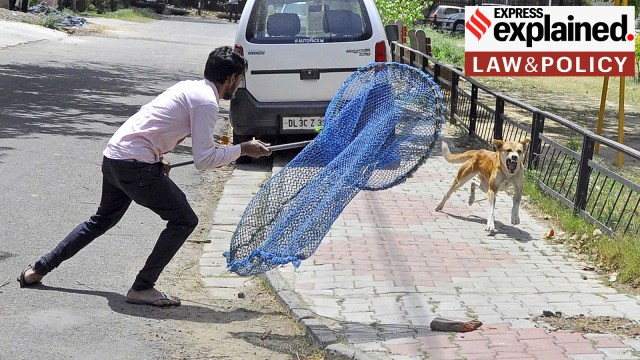Explained: How govt, courts have dealt with stray dogs
SC has directed local authorities in Delhi-NCR to pick up and take all stray dogs to shelters. Govt policy and previous court rulings prescribe in situ management of strays through immunisation and sterilisation.
 A dog-catching drive in Chandigarh in April 2017. (Sahil Walia)
A dog-catching drive in Chandigarh in April 2017. (Sahil Walia)The Supreme Court on Monday (August 11) directed municipal authorities to pick up and house all stray dogs in Delhi and parts of the National Capital Region in dedicated shelters within eight weeks.
The directions were given in a case the top court took up suo motu on July 28 after a “very disturbing and alarming” newspaper report about the death of a six-year old girl due to rabies.
“Infants and young children, at any cost, should not fall prey to rabies…The action should inspire confidence that they [children] can move freely without fear of being bitten by stray dogs,” Justice J B Pardiwala said. “If any individual or organisation comes in the way of picking up stray dogs or rounding them up, we will proceed to take action,” he said.
In 2022, the apex court had upheld a Delhi High Court judgment which said that strays must be tended to and fed within their territories. A provision in the Animal Birth Control (ABC) Rules, 2023, which Justice Pardiwala called “absurd”, states that after immunisation and sterilisation, strays “shall be released at the same place or locality from where they were captured”.
Stated government policy
The Prevention of Cruelty to Animals Act, 1960, which aims to prevent “the infliction of unnecessary pain or suffering on animals”, is the primary animal rights legislation in India.
Under the Act, the Centre in 2001 promulgated the ABC (Dogs) Rules. These rules mandated the sterilisation and immunisation of strays by local authorities supported by animal welfare organisations and private individuals. Humane methods were specified for capturing dogs.
Notably, the rules mandated that dogs be released back into the same area or locality from where they were captured after undergoing sterilisation and immunisation. Euthanisation was only permitted if dogs were critically ill, fatally injured, or rabid.
The government has often reiterated its policy of managing stray dog populations through sterilisation and immunisation.
In 2022, the Animal Welfare Board of India, a statutory body formed by the 1960 Act, issued an advisory which said that “all the RWAs and Citizens of India are requested not to take any kind of adverse action against the feeders of dogs, nor to relocate or resort to poisoning of dogs or other atrocities which is against the law of the land.”
In 2023, the Centre updated the 2001 ABC rules. The 2023 rules were more expansive in their scope to also cover stray cats, and created a three-tiered monitoring structure for immunisation and sterilisation of animals. Maintaining that stray dogs cannot be displaced, the ABC rules reclassified them as “community animals”, and included provisions for community animal feeding.
In April this year, S P Singh Baghel, Union Minister of State for Fisheries, Animal Husbandry and Dairying gave a written response in Lok Sabha that stated that “the intensive implementation of the ABC program by local bodies is the only rational and scientific solution to the overpopulation of the street dogs and controlling incidence of rabies”.
 Dog bites in India.
Dog bites in India.
What courts have held
A government press release on the 2023 rules stated that they “have addressed the guidelines of the Hon’ble Supreme Court” that has “in various orders specifically mentioned that relocation of dogs cannot be permitted”.
Over the years, HCs and the SC have heard several cases, brought by concerned dog lovers or anti-stray residents welfare associations or citizen groups, on human-canine conflict.
HCs have given conflicting orders in these cases. In 2011, the Kerala HC held that local authorities “cannot kill the stray dogs” and “are bound to follow the 1960 Act and the 2001 (ABC) Rules”. On the other hand, the Bombay, Himachal Pradesh, and Karnataka HCs have separately held that local authorities are not bound by the 2001 rules and have discretionary powers under municipal regulations to kill stray dogs.
The apex court, while hearing appeals against High Court decisions or independent writ petitions, has usually not strayed beyond the regulatory scheme set by the state on such matters.
In November 2015, a division Bench of the SC comprising Justices Dipak Misra and Shiva Kirti Singh held that all municipal and local authorities must comply with the Prevention of Cruelty to Animals Act, 1960 and rules made under it.
“Once that is done, we are disposed to think for the present that a balance between compassion to dogs and the lives of human beings, which is appositely called a glorious gift of nature, may harmoniously co-exist,” the Bench said.
In 2022, a three-judge SC Bench comprising Justices U U Lalit, S Ravindra Bhat and Sudhanshu Dhulia upheld a stray dog-friendly judgment from the previous year in which Justice J R Midha of the Delhi HC had held that street dogs have a right to food and citizens have a right to feed them.
“Animals are sentient creatures with an intrinsic value. Therefore, protection of such beings is the moral responsibility of each and every citizen…,” Justice Midha had said. Notably, he emphasised that since they are territorial animals, dogs must be tended to and fed within their territories.
In May last year, in an order closing multiple stray dog-related cases, a division Bench of the SC comprising Justices J K Maheshwari and Sanjay Karol held that it is best for High Courts or “other forums” to adjudicate independently on any local issues that may come up. Its only directive was that all decisions taken must be in accordance with the “the new Rules (from 2023) putting in place mechanism for preventing the infliction of unnecessary pains and sufferings on animals, more specifically the canines”.
On Monday, Justice Pardiwala said: “…If you pick up a stray dog from one part, you sterilise the dog and put him at the same place, that’s absolutely absurd… Why should that stray dog come back to the locality and for what?”
- 01
- 02
- 03
- 04
- 05






































